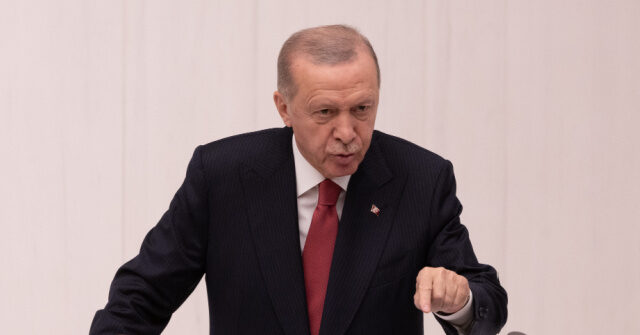Turkish President Recep Tayyip Erdogan warned Kurdish militias in Syria on Wednesday to either lay down their arms or be “buried.” On the same day, the Turkish military said it killed 21 Kurdish militants in northern Syria and Iraq – including members of the People’s Defense Units (YPG), the leading Syrian Kurdish force allied with the United States against the Islamic State.
Erdogan and other Turkish officials have adamantly insisted for years that the YPG is allied with, or merely a branch of, the violent separatist Kurdistan Workers Party (PKK). The PKK is banned in Turkey and classified as a terrorist organization by many other nations, including the United States.
Most other countries, however, regard the Syrian Kurdish YPG militia as a separate entity from the PKK. The YPG holds a leadership role in the Syrian Democratic Forces (SDF), which was instrumental in the fight against ISIS and remains a U.S. ally.
Erdogan repeated Turkey’s view that the YPG and PKK are one and the same in remarks to members of his ruling AKP party on Wednesday.
“The separatist murderers will either bid farewell to their weapons, or they will be buried in Syrian lands along with their weapons,” he said.
“We will eradicate the terrorist organization that is trying to weave a wall of blood between us and our Kurdish siblings,” he added, seeking to draw a distinction between the YPG militia and civilian Kurds, whom Turkey claims to have no problem with.
Last week, the SDF admitted for the first time that PKK fighters are in Syria and were allies against the Islamic State, although the SDF insisted it had no operational links with the PKK.
SDF commander-in-chief Mazloum Abdi told Reuters last week that Kurdish fighters came to Syria from across the Middle East to defend Kurdish lands against the Islamic State, including members of the PKK. He said that while many of the PKK fighters returned home after the fall of ISIS, some “decided to stay and help us.”
Abdi said he was agreeable to Turkey’s demand that non-Syrian Kurdish fighters must leave Syria but said that would not be possible until there was “a total ceasefire between us and the Turkish forces and their affiliated factions.”
“On the other hand, we are preparing ourselves to repel any attack if it happens,” Abdi said.
The major offensive Abdi described has not happened yet, but on Wednesday, the Turkish Defense Ministry said 21 Kurdish militants were killed in northern Syria by Turkish forces, including both PKK and YPG members. One Kurdish fighter was also killed in Iraq.
“Our operations will continue effectively and resolutely,” the Turkish Defense Ministry said.
Some of Turkey’s colleagues in the North Atlantic Treaty Organization (NATO) are growing queasy with Erdogan’s war against the Kurds. On Monday, German Foreign Minister Annalena Baerbock warned that a resurgent ISIS could benefit from Turkey weakening Syrian Kurdish forces.
“It would help no one if the Islamic State terrorists were the ones to benefit from a conflict with the Kurds. This would pose a security threat to Syria, Turkey and Europe,” Baerbock said.
Writing at the Hill on Thursday, Georgetown University adjunct professor David L. Phillips asserted it was time for the United States to stand up for its Kurdish allies in Syria.
Phillips wrote:
Defeating ISIS is still a work in progress; the Kurds are guarding thousands of ISIS prisoners in northeast Syria. If they redeploy to counter a Turkish invasion, the SDF will have a stark choice: either defend their families from a Turkish-backed invasion or stand guard over the ISIS detainees. Defending their homes and families will have priority.
Turkey actually has an answer to that argument, as Foreign Minister Hakan Fidan insisted last weekend that the insurgent government in Syria is perfectly capable of running the ISIS prison camps.
Phillips said the Kurds have provided an “island of stability amid the chaos” by providing a component administration in northeastern Syria during the civil war and warned the U.S. would “incur a reputational cost” if it abandons an effective ally who has largely followed the American model for anti-extremist government.
“Who will join U.S.-led counterinsurgency efforts if we abandon the Kurds now?” he wondered.
“Moral clarity is called for at this perilous moment. Kurds are America’s allies and friends with whom we share strategic interests and values. Kurds are a force for good in Anatolia and Mesopotamia. To secure U.S. interests and reputation, Washington must deter Turkey’s aggression,” he urged.
The moribund Biden administration has said little on the matter of the Syrian Kurds, but there is a bipartisan bill in the Senate to impose sanctions against Turkey if it launches a major operation against the SDF.
Read the full article here
